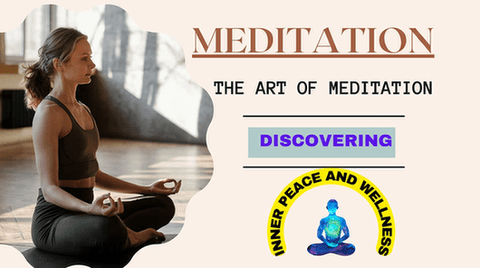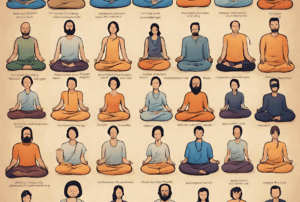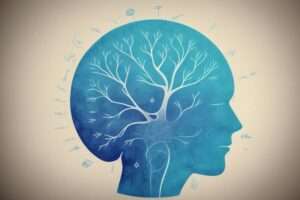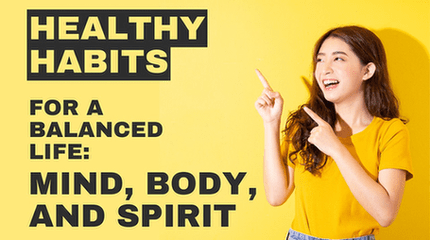Introduction
In our paced world, where stress and anxiety seem to accompany us constantly finding moments of tranquility and clarity can be quite a challenge. However meditation offers a means to nurture our mind, body and soul. In this guide we will delve into the realm of meditation. Exploring its origins, various techniques, profound benefits and practical tips, for getting started.

What is Meditation ?
At its essence meditation is a practice that enables individuals to train their minds and cultivate awareness. This ancient tradition has been embraced by cultures across the globe. It’s important to note that meditation is not about escaping reality or shutting oneself off from the world; rather it’s about discovering a sanctuary of peace within.
How Can I Begin Meditating?
Embarking on your meditation journey is simpler than you might imagine. You don’t require any equipment or a guru to lead you. Here are some straightforward steps to kickstart your meditation practice;
Find a Serene Space; Choose an cozy spot where you can be undisturbed. This could be a nook, in your home a peaceful garden area or even a nearby park.
Get Comfortable; Find a position to sit or lie down. You can use a cushion or chair if needed. The important thing is to feel at ease.
Set a Time; Decide on the duration you’d like to meditate for. Starting with 5 10 minutes is completely fine if you’re new, to meditation.
Focus on Your Breath; Close your eyes. Take a deep breaths. Pay attention to the sensation of your breath as you inhale and exhale noticing the rise and fall.
Be Present; Allow your thoughts to come and go without judgment. If your mind starts to wander gently bring your focus back to your breath.
Practice Regularly; Consistency is key. Try to incorporate meditation into your routine by setting aside the time each day.
Benefits of Meditation?
Meditation offers advantages for both physical well being. Lets explore some of the reasons why integrating meditation into daily life can be beneficial;
1. Stress Reduction; One of the motivations, for engaging in meditation is managing stress. Regular practice helps decrease cortisol levels, which is known as the stress hormone resulting in an more relaxed state of mind.
2.Managing Anxiety; Meditation provides techniques, for handling anxiety by teaching you to observe your thoughts and emotions without getting entangled in them.
3. Focus; If you struggle to concentrate in our paced world meditation can assist in sharpening your focus and boosting productivity.
4. Emotional Well being; Meditation fosters balance, empowering you to respond to lifes challenges with calmness and resilience.
5. Sleep; If you often battle with insomnia or restless nights incorporating meditation into your bedtime routine can result in more rejuvenating sleep.
6. Self awareness; Meditation deepens your understanding of yourself on a level enabling you to make more mindful choices in life.
7. Benefits; In addition to well being meditation offers physical advantages such as reducing blood pressure improving heart health and strengthening the immune system.
How Long Should I Meditate Each Day?
The ideal duration of meditation varies from person to person. Beginners often start with sessions lasting 5 10 minutes.
Gradually increase the duration as they become more comfortable. However even a short daily meditation practice can bring about effects.
Remember, the quality of your practice holds more significance, than the quantity.
Why is it more beneficial to meditate for a few minutes, with focus and intention than sitting for a long time with a restless mind?
Lets explore the impact that meditation has on both the mind and body. Take a look at how this ancient practice can transform your overall well being;
Effects on the Mind;
Reduced Stress; Engaging in meditation triggers a relaxation response that effectively reduces stress levels and fosters a sense of inner calmness.
Improved Mental Clarity; Practicing meditation can enhance clarity allowing you to think more clearly and make wiser decisions.
Enhanced Emotional Regulation; By cultivating intelligence meditation equips you with the ability to navigate your emotions skillfully.
Boosted Creativity; Many artists, writers and thinkers attribute their abilities to their dedicated meditation practices.
Effects on the Body;
Lowered Blood Pressure; Scientific studies have revealed that meditation is effective in lowering blood pressure levels thereby minimizing the risk of heart disease.
Pain Management; Some individuals incorporate meditation into their pain management strategies as it aids in alleviating both acute pain.
Strengthened Immunity; Regular practice of meditation has been found to strengthen the system making your body more resilient against illnesses.
Improved Sleep Quality; Meditation induces relaxation, within the system facilitating sleep initiation and promoting restful nights.
Absolutely! Many people turn to meditation to help cope with stress and anxiety. It’s all, about training the mind to stay present and observe thoughts without judgment. This practice can be a remedy for the racing thoughts and worries that often accompany these conditions. Over time meditation can help you become more resilient, to stress and better manage anxiety.
There are meditation techniques, each offering its unique approach and benefits. Here are some popular types;
Meditation Types;
1. Mindfulness Meditation; This type of meditation involves focusing on the moment observing thoughts, emotions and sensations without passing judgment.
2. Transcendental Meditation (TM); TM utilizes the repetition of a mantra to achieve relaxation and self awareness.
3. Loving Kindness Meditation (Metta); Metta meditation involves cultivating feelings of love and compassion towards oneself as others.
4. Body Scan Meditation; With this practice you systematically direct your attention to parts of your body promoting relaxation and body awareness.
5. Guided Meditation; Guided sessions are led by a teacher who offers guidance and visualizations to support you in relaxing and achieving goals, such, as reducing stress or promoting better sleep.
What is Mindfulness Meditation?
Mindfulness meditation is widely. Extensively studied as a form of meditation. It involves paying attention to your thoughts, emotions and physical sensations in the moment without judgment.
Through meditation you learn to be fully present in whatever activity you engage in. Whether its eating, walking or simply sitting in meditation. By observing your thoughts without getting attached to them you can gain an understanding of your processes and experience greater tranquility.
Can Meditation Enhance Concentration?
Absolutely! Meditation acts as exercise like physical workouts strengthen the body. Regular meditation practice can enhance abilities, including concentration. When you train your mind to focus on a point like your breath or a mantra it becomes adept at staying resisting distractions. Over time this leads to improved concentration which can have impacts on aspects of life such as work, studying and daily tasks.
Is Meditation Associated, with Religion?
Meditation itself is not inherently tied to any beliefs or practices.
Although meditation draws inspiration from traditions, such, as Buddhism and Hinduism it can also be embraced in a secular or non religious context. In fact meditation is open to individuals of all faiths or those who hold no beliefs. It is a practice that can be customized to align with your convictions and aspirations.
Meditation Techniques for Beginners;
If you’re new to meditation it’s completely normal to feel a bit overwhelmed by the multitude of techniques. Below are some beginner meditation methods that can help you embark on your journey;
1. Breath Awareness; This technique represents one of the forms of meditation. Find a seated position. Direct your focus towards your breath. Observe the sensations accompanying each inhalation and exhalation. Whenever your mind drifts away gently guide it back to your breath.
2. Guided Meditation; Explore guided meditation. Recordings that feature experienced instructors leading you through a meditation session. This resource can be particularly beneficial, for beginners.
3. Body Scan; Lie down comfortably and mentally scan through each part of your body starting from the head and gradually moving downwards towards the toes. Take note of any areas holding tension or discomfort consciously releasing them as you progress along this path. This practice aims to foster relaxation and deepen awareness.
4. Practice of Loving Kindness Meditation (Metta); Take a moment to send loving kindness not to yourself but, to others around you. Silently repeat phrases like “May I (or they) experience happiness. May I (or they) enjoy health. May I (or they) live with ease.”
Different Styles of Meditation
As you continue on your meditation journey it’s worth exploring styles of meditation to discover what resonates best with you. Here are some known options;
1. Transcendental Meditation (TM);
In TM, a certified instructor provides you with a mantra that you silently repeat. The goal is to transcend thinking and access levels of consciousness.
2. Zen Meditation (Zazen);
Zazen is a meditation practice often associated with Zen Buddhism. It involves assuming a posture and focusing on the breath or contemplating a koan (a question or statement).
3. Vipassana Meditation;
Vipassana is a form of meditation that involves observing sensations and mental processes as a means of gaining insight into the true nature of reality.
4. Chakra Meditation;
Chakra meditation centers its attention, on the energy centers within the body aiming to align and balance them in order to promote both emotional well being.
Meditation Practices
Engaging, in meditation is akin to exercising the mind, where its effectiveness improves over time like exercise.
Here are a few techniques that can aid in deepening your meditation practice;
Deep meditation practice Techniques;
1. Progressive Muscular Relaxation; to meditating, tense and then relax each muscle group in your body to release any physical tension.
2. Keeping a Journal; Maintain a meditation journal to document your thoughts, experiences and insights. This can assist you in tracking your progress and reflecting on your practice.
3. Mindful Eating; Incorporate mindfulness into your meals by savoring each bite and paying attention to the taste, texture and aroma.
4. Walking Meditation; Extend your mindfulness practice outdoors by walking purposefully focusing on each step taken. The environment around you.
Benefits of Meditation for the Mind
Meditation has impacts on the brain that lead to both functional changes benefiting cognitive abilities as well as emotional well being. Some noteworthy benefits of meditation on the brain include;
1. Increased Gray Matter; Studies have revealed that meditation can increase the density of matter in brain regions associated with memory, learning and self awareness.
2. Enhanced Connectivity; Through meditation connections, between areas of the brain are strengthened, promoting communication and integration of cognitive functions.
3. Stress Reduction;
Regular practice of meditation can lead to a reduction, in the size of the amygdala, which is known as the brains “fight or flight” center. This decrease in size contributes to a decrease in reactivity to stress.
4. Improved ability to focus; Meditation enhances the brains capacity to sustain attention and resist distractions making it easier for individuals to concentrate.
Using Meditation for Stress Relief
In our lives stress has become widespread negatively impacting our mental well being. Meditation provides an effective solution for relieving stress. By incorporating mindfulness techniques and calming practices into your routine you can diminish the impact of stress on your life. Experience inner peace.
The Role of Meditation Apps
In todays era meditation apps have made it simpler than to integrate meditation into your daily life. These apps offer guided meditations, timers and even progress tracking features. Some popular meditation apps include Headspace, Calm, Insight Timer and 10% Happier.
Enhancing Your Practice with Meditation Music
Meditation music can enhance your meditation sessions by creating an environment that promotes relaxation and focus. Whether it involves soothing sounds from nature or the resonance of Tibetan singing bowls or ambient music choosing the soundtrack can help you achieve a state of relaxation during your meditative practice.
Choosing Guided Meditation
Guided meditation is an option for beginners or those seeking outcomes, from their practice. It provides guidance throughout the meditation sessions. a skilled instructor will provide you with guidance and visualization to lead you through the process of meditation. This can be especially beneficial, for relieving stress improving sleep quality and fostering growth.
Sleep Meditation
If you’re struggling with sleep issues like insomnia or restless nights sleep meditation could be the answer you’ve been seeking. These guided meditation practices are specifically designed to quiet your mind and relax your body making it easier for you to drift off into a slumber.
Mindfulness versus Meditation
Although the terms “mindfulness” and “meditation” are often used interchangeably they actually have meanings;
Meditation refers to the practice of training your mind using various techniques like focused attention or cultivating loving kindness.
Mindfulness is a form of meditation that places emphasis on being fully present in the moment and observing thoughts and sensations without judgment.
In essence mindfulness is a type of meditation. Not all forms of meditation necessarily revolve around mindfulness principles.
Long Tail Keywords
Below are some tail keywords related to meditation that might catch your interest;
Physical Benefits of Meditation; Delve into the impact that meditation can have on your physical well being ranging from reduced blood pressure, to enhanced immunity.
Top Recommendations, for Beginners; Find a selection of guided meditation sessions that’re ideal for those who are just starting their meditation journey.
Techniques to Relieve Stress through Meditation; Discover meditation techniques designed to manage and reduce stress.
Enhancing Focus and Concentration with Meditation; Learn about how meditation can sharpen your focus and improve your ability to concentrate on tasks.
Improving Sleep with Meditation; Explore the correlation between meditation and better sleep and gain insights into techniques for a nights sleep.
Meditation Practices for Mental Health Enhancement; Dive into meditation practices that can promote well being providing strategies, for emotional balance.
Can Meditation. Enhance Sleep Benefits? Delve into the concept of whether meditation can substitute for or amplify the advantages of sleep.
Health-related books References-
Learn More- Soothing Paths to Peace: A Journey Through Backroad Wellness in Cambridge, Ohio
Learn More- Unlock Weight Loss Success with Alpine Ice Hack Method
Learn More about – A Deep Dive into Coastal Wellness
Read- “Healthy Habits for a Balanced Life: Mind, Body, and Spirit”













